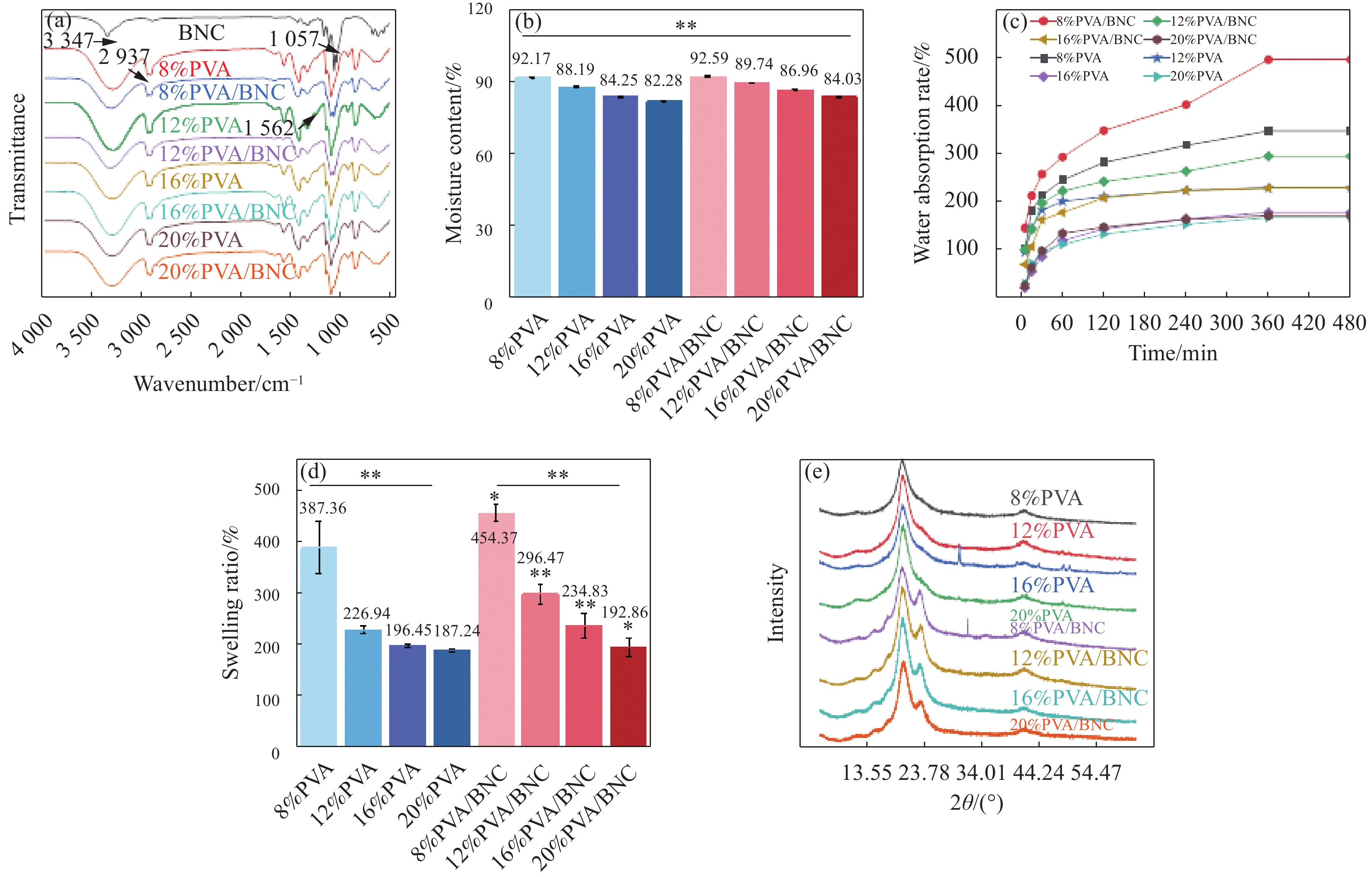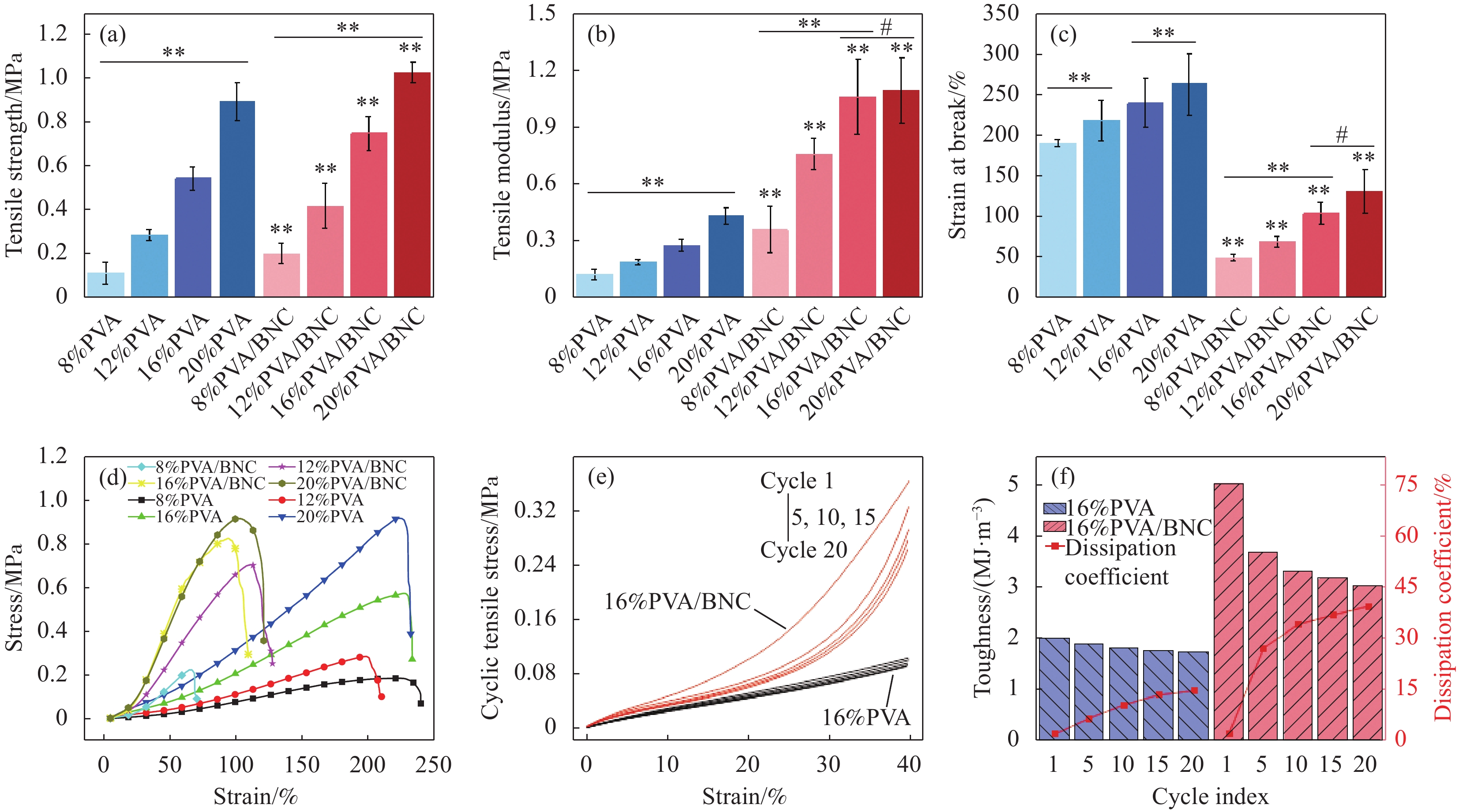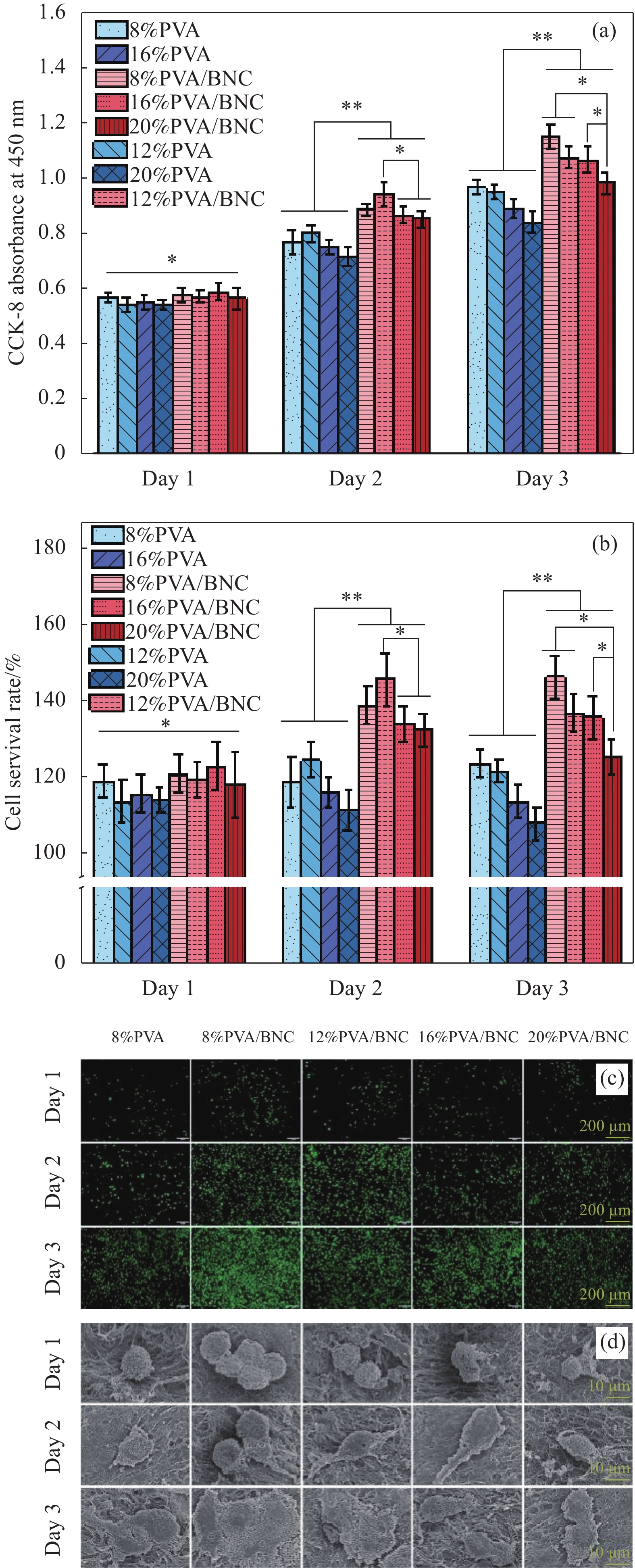Preparation and properties of artificial auricles based on PVA/BNC composites
-
摘要:
耳廓再造的关键是实现植入材料与天然组织间的生物力学适配,然而迄今尚未找到一种理想的耳廓替代物。本文将细菌纳米纤维素(Bacterial nanocellulose,BNC)匀浆加至不同浓度的聚乙烯醇(Polyvinyl alcohol,PVA)水溶液中,通过冻融法使两者物理交联形成兼具高弹柔韧性和高力学强度的PVA/BNC复合材料,并对其理化性能和细胞相容性进行表征。结果表明:该材料具有高吸水性、低溶胀比,较高的韧性、弹性和缝合强度等特点,最大压缩模量可达到(6.98±0.49) MPa,与天然耳廓组织的生物力学相适配。最大缝合强度可达(7.06±0.33) N,完全满足临床缝合需求。BNC的加入促进了细胞在材料表面的粘附、生长和增殖,使PVA/BNC复合材料具有更高的细胞密度和活力,是一种很有潜力的人工耳廓材料。
Abstract:The key to auricle reconstruction is to achieve a biomechanical fit between the implanted material and the natural tissue. So far, an ideal auricle substitute has not been found. In this study, bacterial nanocellulose (BNC) homogenate was added into polyvinyl alcohol (PVA) aqueous solutions of different concentrations, and the freeze-thaw method was used to form PVA/BNC composite materials with both high elastic flexibility and high mechanical strength via physically cross-linking. The physical and chemical properties and cytocompatibility of the composites were characterized. The results show that the material has the characteristics of high water absorption, low swelling ratio, as well as high toughness, elasticity and suture strength. The maximum compressive modulus reaches (6.98±0.49) MPa, which matches the biomechanics of natural auricle tissue. The maximum suture strength reaches (7.06±0.33) N, which fully meets the needs of clinical suture. Addition of BNC promotes the adhesion, growth and proliferation of cells on the surface of the material, giving the PVA/BNC composite material higher cell density and vitality. All the results show that the PVA/BNC composite is a promising biomaterial for artificial auricles.
-
现代电气电子设备趋于向大功率、小体积及高密高频、集成化、微型化方向发展,其直接后果便是在更小的体积内产生了更多的热量,如果这些热量无法及时向外传递,将加速绝缘老化,严重影响设备的运行效率和可靠性,甚至发生故障或事故[1-3]。提高绝缘封装材料的导热性能是解决电气电子设备热管理问题的最有效途径[4-6]。环氧树脂是应用最为广泛的绝缘封装材料之一,但纯环氧树脂的导热系数低(0.20 W·(m·K)−1),极大限制了其在现代电气电子设备中的应用。为了提高环氧树脂材料的导热性能,将高导热绝缘填料,如Al2O3、MgO、ZnO、BN、氮化铝(AlN)等,添加到基体中,获得填充型导热复合材料是一种简单有效的解决方法[7-12]。其中,球形Al2O3因其导热系数较高、成本低、介电性能优良,且在聚合物基体中剪切阻力小、黏度低,而得到广泛应用[13-14]。然而,采用常规共混制备的Al2O3/环氧树脂复合材料,由于填料在基体中随机分布,不易相互连接形成导热通路,复合材料导热系数的提高有限[15-16]。
在聚合物基体中构建由高导热填料相互连接而形成的导热通路是提高复合材料导热性能的有效策略。如吴加雪等[17]采用四针状氧化锌晶须(T-ZnOw)和片状氮化硼(BN)混杂填充环氧树脂,使填料间更容易相互搭接形成导热通路。Chen等[18]在氮化硼纳米片(BNNS)表面沉积纳米Ag后与环氧树脂复合,然后经300℃热处理,使纳米Ag熔融烧结而将BNNS相互连接形成导热通路。Yu等[19]在三聚氰胺甲醛海绵表面吸附BNNSs,并进一步经多巴胺修饰后,浸渍BN/环氧树脂,制备叶脉结构的二级可调网络导热通路。Ren等[20]将Al2O3采用偶联剂修饰后,沉积纳米银,然后与环氧树脂复合,利用纳米银颗粒的桥联作用,以促进热传导,降低填料间接触热阻。Hao等[21]及Hu等[22]分别采用双轴压缩和凝胶注模成型,然后高温烧结,预先制备3D多孔结构Al2O3骨架,再真空浸渍环氧树脂,构建3D互联结构导热通路。这些方法通常需要较高的固化或处理温度,且工艺复杂,成本高。本文采用共还原法,在Al2O3微球表面沉积低熔点纳米锡铋合金颗粒(Sn57Bi43),制备Al2O3-Sn57Bi43杂化材料,用于环氧树脂的导热绝缘填料。当环氧树脂受热固化时,填料表面Sn57Bi43颗粒熔融,将填料相互连接而形成有效的导热通路,提高复合材料导热率。同时,由于Sn57Bi43被绝缘性Al2O3及树脂基体隔离,Al2O3-Sn57Bi43/环氧树脂复合材料仍具有电绝缘性能。
1. 实验材料及方法
1.1 原材料
环氧树脂:工业级,牌号CYD-128,环氧值0.51~0.54,岳阳巴陵华兴石化有限公司;594固化剂:β, β'-二甲氨基乙氧基-1, 3, 6, 2-三恶硼杂八环,工业级,无锡钱广化工原料有限公司;球形Al2O3导热绝缘填料:上海瑀锐新材料科技有限公司;BiCl3和SnCl2·2H2O:分析纯,上海麦克林生化科技有限公司;36%~38%的HCl水溶液及KBH4:化学纯,国药集团化学试剂有限公司。
1.2 Al2O3-Sn57Bi43杂化材料的制备
参照文献[23]所述方法制备Al2O3-Sn57Bi43杂化材料。具体过程如下:第一步,将20.53 g (0.091 mol) SnCl2·2H2O、21.44 g (0.068 mol) BiCl3溶于500 mL HCl水溶液;第二步,在氮气保护,冰浴条件下,将78.18 g (1.45 mol) KBH4溶于1000 mL水,然后加入100 g Al2O3;第三步,在氮气保护、冰浴条件下,将第一步所得溶液滴加到第二步所得溶液中,3~4 h滴加完毕,然后继续反应1 h;第四步,离心分离,倒出上层清液,然后再加入适量水、离心分离,如此反复3~4次,以去除未反应的BiCl3、SnCl2·2H2O、HCl等杂质;第五步,将沉淀物经80℃真空干燥24 h,得灰色Al2O3-Sn57Bi43杂化材料。
1.3 Al2O3-Sn57Bi43/环氧树脂复合材料的制备
将环氧树脂和594固化剂按质量比10∶1室温搅拌混合均匀后,加入Al2O3-Sn57Bi43,初步搅拌混合后再将混合物进一步经行星式离心真空混合机混合、脱泡,再将混合物经150℃/4 h固化,即得Al2O3-Sn57Bi43/环氧树脂复合材料。按同样的方法,制备填料体积含量(Vf)相同的Al2O3/环氧树脂复合材料作为对比。计算复合材料的Vf值时,需预先测得基体及填料密度。环氧树脂基体材料(固化后)、Al2O3和Al2O3-Sn57Bi43的密度采用东莞市宏拓仪器有限公司DahoMeter DH-300固液两用比重计,阿基米德法测试,结果分别为1.19 g·cm−3、3.88 g·cm−3和4.36 g·cm−3。图1为Al2O3-Sn57Bi43杂化材料及Al2O3-Sn57Bi43/环氧树脂复合材料的制备过程示意图。
1.4 测试与表征
X-射线光电子能谱(XPS)采用美国Thermo Fisher Scientific公司ESCALAB250Xi,测试条件为铝靶(Kα,hν=1486.6 eV),阴极加速电压14.0 kV,功率250 W,真空度5×10−8 Pa。全谱扫描分辨率1 eV,窄普扫描分辨率0.1 eV。差示扫描量热分析(DSC)采用德国Netzsch204F1,扫描范围30~320℃,升温速率10℃/min。微观形貌观察采用日本JSM-5600LV场发射扫描电子显微镜,喷金后观察。复合材料的热扩散率(α)采用德国Netzsch公司LFA 467HT HyperFlash导热系数测量仪,激光闪射法室温测试,然后通过公式λ=αCpρ求出导热系数(λ)。Cp为材料的比热容,采用DSC蓝宝石法测试;ρ为材料密度,采用阿基米德排水法测试。材料拉伸断裂强度按GB/T 1040.1—2018[24]测试,体积电阻率和介电强度分别按GB/T 1410—2006[25]和GB/T 1408.1—2016[26]。介质损耗按GB/T 1409—2006[27]测试,频率50 Hz。
2. 结果与讨论
按1.2节所述的Al2O3-Sn57Bi43的制备工艺,由于还原剂过量,Sn2+和Bi3+全部被还原,因此杂化材料中Sn57Bi43的理论含量为20wt%。图2为Al2O3和所制备Al2O3-Sn57Bi43的XPS全谱及Sn3d、Bi4f的高分辨率窄谱。72.9 eV和529.5 eV处分别为Al2p和O1s的峰,与Al2O3相比,Al2O3-Sn57Bi4在484.9 eV和493.3 eV处检测出明显的Sn3d5/2和Sn3d3/2峰,在156.4 eV和161.7 eV处检测出明显的Bi4f7/2和Bi4f5/2峰。由XPS计算得到的样品元素质量含量见表1,与理论结果基本一致。
表 1 Al2O3和Al2O3-Sn57Bi43的元素组成Table 1. Element compositions of Al2O3 and Al2O3-Sn57Bi43wt% Sample Al O Sn Bi Al2O3 50.72 47.36 0.00 0.00 Al2O3-Sn57Bi43 40.25 37.98 8.51 11.38 图3为Al2O3和Al2O3-Sn57Bi43的DSC曲线。Al2O3-Sn57Bi43在140.3℃左右出现的峰为低熔点Sn57Bi43合金颗粒的熔融吸收峰[23]。
图4为Al2O3和Al2O3-Sn57Bi43杂化材料及经150℃/2 h处理后杂化材料的SEM图像。Al2O3的粒径为5~25 μm,杂化材料表面吸附有Sn57Bi43颗粒,其粒径约100~300 nm,经150℃/2 h处理后的杂化材料表面,Sn57Bi43颗粒发生明显的熔融团聚现象。
图5为填料体积含量Vf =60vol%的Al2O3/环氧树脂及Al2O3-Sn57Bi43/环氧树脂复合材料横截面的SEM图像。Al2O3/环氧树脂复合材料的填料-基体界面处存在明显空隙。Al2O3-Sn57Bi43/环氧树脂复合材料的填料-基体界面处空隙明显减少,说明界面性能改善。这一方面是由于Al2O3-Sn57Bi43表面的Sn57Bi43纳米颗粒使填料的粗糙度及比表面积增大,另一方面是由于Al2O3-Sn57Bi43杂化填料表面熔融而提高了环氧树脂基体对填料的浸润性。Al2O3-Sn57Bi43/环氧树脂复合材料界面性能的改善不仅可以降低基体-填料间界面热阻,提高材料导热系数,而且可以提高材料的力学性能。
表2为不同填料体积含量的Al2O3/环氧树脂和Al2O3-Sn57Bi43/环氧树脂复合材料的密度、比热容及热扩散系数。随着填料含量的增加,复合材料的密度及扩散系数增加,比热容下降。由材料的密度、比热容及热扩散系数,可计算出导热系数。
表 2 Al2O3/环氧树脂和Al2O3-Sn57Bi43/环氧树脂复合材料的密度、比热容及热扩散系数Table 2. Density, specific heat capacity and thermal diffusion coefficient of Al2O3/epoxy and Al2O3-Sn57Bi43/epoxy compositesVf/% Al2O3/epoxy Al2O3-Sn57Bi43/epoxy Density/
(kg·m−3)Specific heat
capacity/[J·(kg·K)−1]Thermal diffusion
coefficients/(m2·s−1)Density/
(kg·m−3)Specific heat
capacity/[J·(kg·K)−1]Thermal diffusion
coefficients/(m2·s−1)0 1.19×103 1106.43 1.52×10−7 1.19×103 1106.43 1.52×10−7 6 1.35×103 1045.03 1.42×10−7 1.38×103 1016.70 1.50×10−7 11 1.49×103 1004.05 1.41×10−7 1.54×103 958.87 1.49×10−7 14 1.57×103 982.84 1.43×10−7 1.63×103 929.55 1.51×10−7 17 1.65×103 963.71 1.76×10−7 1.73×103 903.46 2.05×10−7 22 1.78×103 935.68 2.46×10−7 1.89×103 865.83 3.12×10−7 29 1.97×103 902.86 3.04×10−7 2.11×103 822.64 4.09×10−7 38 2.21×103 868.87 4.94×10−7 2.39×103 778.87 7.77×10−7 48 2.48×103 838.89 5.81×10−7 2.71×103 741.04 10.05×10−7 55 2.67×103 821.50 7.48×10−7 2.93×103 719.42 12.90×10−7 60 2.80×103 810.51 8.03×10−7 3.09×103 705.88 13.51×10−7 图6为填料体积含量(Vf)对Al2O3/环氧树脂及Al2O3-Sn57Bi43/环氧树脂复合材料导热系数的影响。当Vf 较低时,随Vf增加,复合材料导热系数的增加非常缓慢。这是由于当Vf较低时,填料呈“孤岛”状分布在基体中,相互之间基本无接触,不能形成导热通路。当Vf增加到某一程度,填料间相互接触的概率增加,导热通路亦开始形成,这时随Vf增加,材料导热系数明显增加。该Vf值(约20vol%)即为填料的临界体积含量(Vc)。在Vf相等条件下,Al2O3-Sn57Bi43/环氧树脂复合材料的导热系数明显大于Al2O3/环氧树脂复合材料的导热系数。当Vf =60vol%时,Al2O3-Sn57Bi43/环氧树脂复合材料的导热系数为2.95 W·(m·K)−1,比Al2O3/环氧树脂复合材料的导热系数(1.82 W·(m·K)−1)提高了62.1%。
采用非线性Foygel模型考察Al2O3表面沉积Sn57Bi43对填料间接触热阻(Rc)的影响,其公式如下[28-29]:
λ−λ1=λ0(Vf−Vc1−Vc)β (1) 式中:λ、λ1分别为复合材料、聚合物基体的导热系数;λ0为指前因子;Vf为填料体积含量;Vc为填料的临界体积含量,超过该值,填料间开始发生接触,形成导热通路,材料导热系数明显增加;β为与导热系数有关的幂指数。
由图6可知,Vc约为20%,小于或大于该值,两种材料的λ-Vf均呈良好的线性相关。将Vf大于或小于20%时的λ-Vf分别进行线性拟合,两直线的交点所对应的Vf值即为Vc,结果见表3。将式(1)取对数,得如下公式:
表 3 Al2O3/环氧树脂和Al2O3-Sn57Bi43/环氧树脂复合材料导热系数的非线性Foygel模拟结果Table 3. Simulation results of nonlinear Foygel model for the thermal conductivity of Al2O3/epoxy and Al2O3-Sn57Bi43/epoxy compositesSample Vc/% λ0/(W·(m·K)−1) β Rc/(K·W−1) Al2O3 19.23 3.42 1.088 1.17×105 Al2O3-Sn57Bi43 18.25 6.73 1.253 8.35×104 Notes: Vc—Critical volume fraction of filler; λ0—Pre-exponential factor; β—Conductivity exponent that depends on the aspect of filler; Rc—Interface thermal resistance. lg(λ−λ1)=lgλ0+βlg(Vf−Vc1−Vc) (2) 图7为式(2)的线性拟合结果,与实验结果基本一致。由图7可以得到λ0、β,根据下式:
Rc=1λ0LVβc (3) 可以得到复合材料中填料间接触热阻Rc,L为填料直径,取平均值15 μm。表3为两种复合材料导热系数的模拟分析结果。Al2O3-Sn57Bi43/环氧树脂复合材料的Rc=8.35×104 K·W−1,明显小于Al2O3/环氧树脂复合材料的Rc=1.17×105 K·W−1。
基于热传导的串并联模型,并考虑到填料间发生相互接触对填充型复合材料导热系数的影响,Agari等[30]提出了如下公式:
lgλ=Vf[C2lgλ2−lg(C1λ1)]+lg(C1λ1) (4) 式中:λ2为填料的导热系数;C1表示影响聚合物结晶度和结晶尺寸的因子;C2表示填料形成导热链难易程度的因子,C2值越大,表示填料越容易相互聚集形成导热通路。
图8为复合材料的lgλ-Vf关系曲线。可知,在低Vf(<20vol%)时,两种复合材料的lgλ-Vf关系曲线的线性程度较差,而在高Vf时,两种复合材料的lgλ-Vf关系曲线呈良好的线性相关。这是由于在低填充量下,填料呈“孤岛”状分布在基体中,相互接触形成导热链的概率极低,此时,填料-基体间界面热阻对材料导热性能的影响较大,但在公式中未能体现该因素的影响,因此,lgλ-Vf关系曲线的线性程度较差。在高Vf时,填料相互接触概率增大,此时,填料间相互连接形成导热通路的难易程度对材料导热性能影响也随之变大,因此,lgλ-Vf关系曲线的线性程度较好。
![]() 图 7 Al2O3/环氧树脂和Al2O3-Sn57Bi43/环氧树脂复合材料的lg(λ-λ1)-lg[(Vf-Vc)/(1-Vc)]曲线λ1 and λ2—Thermal conductivity of polymer and fillers respectively; Vf—Volume fraction of fillers; Vc—Critical volume fraction of fillersFigure 7. lg(λ-λ1)-lg[(Vf-Vc)/(1-Vc)] curves of Al2O3/epoxy and Al2O3-Sn57Bi43/epoxy composites
图 7 Al2O3/环氧树脂和Al2O3-Sn57Bi43/环氧树脂复合材料的lg(λ-λ1)-lg[(Vf-Vc)/(1-Vc)]曲线λ1 and λ2—Thermal conductivity of polymer and fillers respectively; Vf—Volume fraction of fillers; Vc—Critical volume fraction of fillersFigure 7. lg(λ-λ1)-lg[(Vf-Vc)/(1-Vc)] curves of Al2O3/epoxy and Al2O3-Sn57Bi43/epoxy composites表4为两种复合材料的C1和C2模拟结果。Al2O3/环氧树脂及Al2O3-Sn57Bi43/环氧树脂复合材料的C1值非常接近。这是由于环氧树脂是交联型非结晶材料,加入填料后对环氧树脂的聚集态结构无实质性影响。Al2O3-Sn57Bi43/环氧树脂复合材料的C2值明显大于Al2O3/环氧树脂复合材料的C2值,说明Al2O3-Sn57Bi43比Al2O3更容易在环氧基体中相互连接形成导热链。这可能是由于Al2O3-Sn57Bi43表面Sn57Bi43熔融而将填料相互连接的缘故。
表 4 Al2O3/环氧树脂和Al2O3-Sn57Bi43/环氧树脂复合材料导热系数的Agari模拟结果Table 4. Agari simulation results for the thermal conductivity of Al2O3/epoxy and Al2O3-Sn57Bi43/epoxy compositesSample C1 C2 Al2O3 0.7661 0.8991 Al2O3-Sn57Bi43 0.7495 1.1465 Notes: C1—Factor affecting crystallinity and crystal size of polymer; C2—Factor of ease in forming conductive chains of fillers. 表5为填料体积含量Vf对Al2O3/环氧树脂和Al2O3-Sn57Bi43/环氧树脂复合材料拉伸性能的影响。随Vf增加,Al2O3/环氧树脂复合材料的拉伸断裂强度及断裂伸长率均下降,这是由于填料与基体的界面性能差。随Vf增加,Al2O3-Sn57Bi43/环氧树脂复合材料的拉伸断裂强度及断裂伸长率提高,这是由于填料-基体间界面性能改善及Al2O3-Sn57Bi43形成的网链结构能起到传递应力,阻止裂纹扩张的作用。
表6为填料体积含量对Al2O3/环氧树脂和Al2O3-Sn57Bi43/环氧树脂复合材料电性能的影响。Al2O3/环氧树脂复合材料的体积电阻率、介质损耗角正切(tanδ)和介电强度和分别为1013 Ω·m、10−3和25 MV·m−1左右,基本不受Vf的影响。随Vf增加,Al2O3-Sn57Bi43/环氧树脂复合材料的tanδ增加,介电强度和体积电阻率下降。这可能是由于复合材料中的Sn57Bi43金属导体导致漏导损耗和极化损耗的原因。当Vf =60vol%时,Al2O3-Sn57Bi43/环氧树脂复合材料的体积电阻率为8.6×1011 Ω·m,仍具有电绝缘性(体积电阻率≥1011 Ω·m)。通常,在导电粒子填充树脂基复合材料中,当粒子之间开始相互接触,形成逾渗网络时,体系的电阻率将急剧下降,甚至由绝缘体向半导体或导体转变。在本文中,Sn57Bi43的含量很低,不足以形成导电逾渗网络。另外,电绝缘性基体及Al2O3产生的隧穿势垒也阻碍了电子传递。
表 5 填料体积含量对Al2O3/环氧树脂和Al2O3-Sn57Bi43/环氧树脂复合材料拉伸断裂强度的影响Table 5. Effects of filler volume fraction on tensile properties of Al2O3/epoxy and Al2O3-Sn57Bi43/epoxy compositesVf/vol% Al2O3/epoxy Al2O3-Sn57Bi43/epoxy Tensile strength/MPa Elongation at break/% Tensile strength/MPa Elongation at break/% 0 44.56±1.83 4.47±0.17 44.56±1.83 4.47±0.17 20 40.31±1.20 4.06±0.14 46.84±2.04 4.75±0.21 40 37.41±1.15 3.54±0.15 49.65±2.16 5.09±0.19 60 32.28±1.09 3.21±0.11 51.62±2.62 5.36±0.24 表 6 填料体积含量对Al2O3/环氧树脂和Al2O3-Sn57Bi43/环氧树脂复合材料电性能的影响Table 6. Effects of filler volume fraction on electric properties of Al2O3/epoxy and Al2O3-Sn57Bi43/epoxy compositesVf/vol% Al2O3/epoxy Al2O3-Sn57Bi43/epoxy Volume resistivity/
(1013 Ω·m)Dielectric strength/
(MV·m−1)Dielectric loss tanδ/
10−3Volume resistivity/
(1013 Ω·m)Dielectric strength/
(MV·m−1)Dielectric loss tanδ/
10−30 2.67±0.68 25.8±1.6 4.75±0.08 2.670±0.680 25.8±1.6 4.75±0.08 20 2.79±0.51 25.2±2.1 3.98±0.06 0.921±0.106 22.1±1.4 11.02±0.22 40 2.81±0.62 24.5±1.9 5.22±0.07 0.264±0.096 19.6±1.2 15.46±0.97 60 2.87±0.75 24.3±1.3 4.75±0.07 0.086±0.034 18.5±1.3 19.43±1.46 3. 结 论
(1) 采用共还原法,在Al2O3表面沉积低熔点纳米锡铋合金颗粒(Sn57Bi43),制备了杂化材料(Al2O3-Sn57Bi43),用于环氧树脂的导热绝缘填料。当环氧树脂受热固化时,Al2O3-Sn57Bi43表面Sn57Bi43熔融,将填料相互连接而形成有效的导热通路,提高复合体系导热性能。当填料体积含量为60vol%时,Al2O3-Sn57Bi43/环氧树脂复合材料的导热系数为2.95 W·(m·K)−1,比Al2O3/环氧树脂复合材料的导热系数(1.82 W·(m·K)−1)提高了62.1%。
(2) Fogyel模型分析表明,Al2O3-Sn57Bi43/环氧树脂复合材料的填料间接触热阻(Rc)为8.35×104 K·W−1,明显小于Al2O3/环氧树脂复合材料的Rc=1.17×105 K·W−1;Agari模型分析表明,Al2O3-Sn57Bi43比Al2O3更容易在环氧树脂基体中相互连接形成导热链。
(3) 随填料体积含量增加,Al2O3/环氧树脂复合材料的拉伸断裂强度及拉伸断裂伸长率下降,而Al2O3-Sn57Bi43/环氧树脂复合材料的拉伸断裂强度及拉伸断裂伸长率提高。与Al2O3/环氧树脂复合材料相比,Al2O3-Sn57Bi43/环氧树脂复合材料的介质损耗增加,介电强度和体积电阻率下降。当填料体积含量为60vol%时,Al2O3-Sn57Bi43/环氧树脂复合材料的体积电阻率为1011 Ω·m,低于Al2O3/环氧树脂复合材料的体积电阻率(1013 Ω·m),但仍具有电绝缘性能。
-
图 1 聚乙烯醇(PVA)、PVA/细菌纳米纤维素(BNC)材料的宏观、微观形貌:(a)不同浓度PVA、PVA/BNC材料的宏观形貌;(b)耳朵状样品图;(c)材料的微观形貌
Figure 1. Macroscopic and microscopic morphologies of polyvinyl alcohol (PVA) and PVA/bacterial nanocellulose (BNC) materials: (a) Macroscopic morphology of PVA and PVA/BNC materials with different concentrations; (b) Diagram of an auricular sample; (c) Microscopic topography of materials
图 2 材料的基本理化性质:(a)不同浓度PVA、PVA/BNC材料的红外图谱;(b)含水率;(c)吸水率;(d)饱和溶胀率;(e) XRD图谱
Figure 2. Basic physical and chemical properties of materials: (a) Fourier transform infrared spectra of PVA and PVA/BNC materials with different concentrations; (b) Moisture content; (c) Water absorption rate; (d) Saturated swelling rate; (e) XRD patterns
图 3 PVA和PVA/BNC材料的压缩力学性能与缝合强度:(a)不同浓度PVA、PVA/BNC材料的压缩强度;(b)压缩模量;(c)压缩应力-应变曲线;(d) 16%PVA和16%PVA/BNC循环压缩应力-应变曲线;(e)循环压缩能量耗散与能量损耗系数;(f)缝合强度
Figure 3. Compressive mechanical properties and suture strength of PVA and PVA/BNC materials: (a) Compressive strength of PVA and PVA/BNC materials with different concentrations; (b) Compressive modulus; (c) Compressive stress-strain curves; (d) 16%PVA and 16%PVA/BNC cyclic compressive stress-strain curves; (e) Cyclic compression energy dissipation and energy dissipation coefficient; (f) Suture retention
图 4 PVA、PVA/BNC材料的拉伸力学性能:(a)各PVA、PVA/BNC材料的拉伸强度;(b)拉伸模量;(c)断裂伸长率;(d)拉伸应力-应变曲线;(e) 16%PVA和16%PVA/BNC循环拉伸应力-应变曲线;(f)循环拉伸韧性与能量损耗系数
Figure 4. Tensile mechanical properties of PVA and PVA/BNC materials: (a) Tensile strength of PVA and PVA/BNC materials; (b) Tensile modulus; (c) Elongation at break; (d) Tensile stress-strain curves; (e) 16%PVA and 16%PVA/BNC cyclic tensile stress-strain curves; (f) Cyclic tensile toughness and energy dissipation coefficient
图 5 小鼠成纤维细胞的相容性:(a) CCK-8实验结果;(b)浸提液培养的细胞存活率;(c)浸提液培养L929细胞1、2、3天后细胞荧光图;(d)电镜显示细胞在材料上生长1、3、5天后的形态图
Figure 5. Cytocompatibility of mouse fibroblasts: (a) CCK-8 experimental results; (b) Cell viability of extract culture; (c) Cell fluorescence pattern of L929 cells after culture in extract for 1, 2 and 3 days; (d) Electron microscopy showing morphology of cells after 1, 3, and 5 days of growth on the material
表 1 材料的配方
Table 1 Formulations of materials
Sample PVA (w/v) BNC (w/v) 8%PVA 8% 0% 12%PVA 12% 0% 16%PVA 16% 0% 20%PVA 20% 0% 8%PVA/BNC 8% 30% 12%PVA/BNC 12% 30% 16%PVA/BNC 16% 30% 20%PVA/BNC 20% 30% Notes: PVA—Polyvinyl alcohol; BNC—Bacterial nanocellulose; w/v—Mass volume fraction. 表 2 孔隙率与比表面积测试结果
Table 2 Porosity and specific surface area test results
Sample Skeletal density/(g·cm−3) Apparent density/(g·cm−3) Porosity/% Specific surface area/(m2·g−1) BNC
16%PVA
16%PVA/BNC1.056 ± 0.017
1.219 ± 0.006
1.207 ± 0.0050.009
0.909
0.45599.17
25.47
62.2758.98
24.96
26.48表 3 材料的结晶度
Table 3 Crystallinity of materials
Sample Crystallinity/% BNC 44.73 ± 5.07 8%PVA 34.08 ± 4.36 12%PVA 34.66 ± 9.87 16%PVA 35.80 ± 8.60 20%PVA 36.15 ± 6.28 8%PVA/BNC 37.38 ± 7.52 12%PVA/BNC 38.39 ± 7.88 16%PVA/BNC 45.68 ± 3.94 20%PVA/BNC 40.07 ± 1.47 -
[1] JIANG C, ZHAO C, CHEN B, et al. Auricular reconstruction using Medpor combined with different hearing rehabilitation approaches for microtia[J]. Acta Otolaryngol, 2021, 141(6): 572-578. DOI: 10.1080/00016489.2021.1900601
[2] SHIEH S J, TERADA S, VACANTI J P. Tissue engineering auricular reconstruction: In vitro and in vivo studies[J]. Biomaterials, 2004, 25(9): 1545-1557. DOI: 10.1016/S0142-9612(03)00501-5
[3] PARK J Y, CHOI Y J, SHIM J H, et al. Development of a 3D cell printed structure as an alternative to autologs cartilage for auricular reconstruction[J]. Journal of Biomedical Materials Research Part B: Applied Biomaterials, 2017, 105(5): 1016-1028. DOI: 10.1002/jbm.b.33639
[4] 王艺蒙. 力学仿生耳软骨组织工程支架的3D打印及应用基础研究[D]. 北京: 北京协和医学院, 2022. WANG Yimeng. Basic research on 3D printing and application of mechanical bionic ear cartilage tissue engineering scaffold[D]. Beijing: Peking Union Medical College, 2022(in Chinese).
[5] FENG P, ZHAO R, TANG W, et al. Structural and functional adaptive artificial bone: Materials, fabrications, and properties[J]. Advanced Functional Materials, 2023, 33(23): 2214726. DOI: 10.1002/adfm.202214726
[6] 张如鸿, 曹谊林. 全耳再造的过去、现在和将来[J]. 组织工程与重建外科, 2005(2): 109-114. ZHANG Ruhong, CAO Yilin. The past, present and future of whole ear reconstruction[J]. Journal of Tissue Engineering and Reconstructive Surgery, 2005(2): 109-114(in Chinese).
[7] HAN Y, LI C, CAI Q, et al. Studies on bacterial cellulose/poly(vinyl alcohol) hydrogel composites as tissue-engineered corneal stroma[J]. Biomedical Materials, 2020, 15: 035022. DOI: 10.1088/1748-605X/ab56ca
[8] SVENSSON A, NICKLASSON E, HARRAH T, et al. Bacterial cellulose as a potential scaffold for tissue engineering of cartilage[J]. Biomaterials, 2005, 26(4): 419-431. DOI: 10.1016/j.biomaterials.2004.02.049
[9] 唐敬玉, 包露涵, 李雪, 等. 细菌纳米纤维素与聚乙烯醇复合水凝胶管的生物相容性表征[J]. 中国组织工程研究, 2017, 21(34): 5474-5480. TANG Jingyu, BAO Luhan, LI Xue, et al. Biocompatibility characterization of bacterial nanocellulose and polyvinyl alcohol composite hydrogel tubes[J]. Chinese Journal of Tissue Engineering Research, 2017, 21(34): 5474-5480(in Chinese).
[10] HU G Q, CHEN L, ZHAO S, et al. Mercerization of tubular bacterial nanocellulose for control of the size and performance of small-caliber vascular grafts[J]. Chemical Engineering Journal, 2022, 428: 131104. DOI: 10.1016/j.cej.2021.131104
[11] NIMESKERN L, MARTINEZ A H, SUNDBERG J, et al. Mechanical evaluation of bacterial nanocellulose as an implant material for ear cartilage replacement[J]. Journal of the Mechanical Behavior of Biomedical Materials, 2013, 22: 12-21. DOI: 10.1016/j.jmbbm.2013.03.005
[12] HU G Q, LI G L, CHEN L, et al. Production of novel elastic bacterial nanocellulose/polyvinyl alcohol conduits via mercerization and phase separation for small-caliber vascular grafts application[J]. International Journal of Biological Macromolecules, 2023, 239: 124221.
[13] WANG J, GAO C, ZHANG Y, et al. Preparation and in vitro characterization of BC/PVA hydrogel composite for its potential use as artificial cornea biomaterial[J]. Materials Science and Engineering: C, 2010, 30(1): 214-218. DOI: 10.1016/j.msec.2009.10.006
[14] ZHAO J, TONG H, KIRILLOVA A, et al. A synthetic hydrogel composite with a strength and wear resistance greater than cartilage[J]. Advanced Functional Materials, 2022, 32: 2205662. DOI: 10.1002/adfm.202205662
[15] MILLON L E, WAN W K. The polyvinyl alcohol-bacterial cellulose system as a new nanocomposite for biomedical applications[J]. Journal of Biomedical Materials Research Part B: Applied Biomaterials, 2006, 79B(2): 245-253. DOI: 10.1002/jbm.b.30535
[16] CHEN G, CHEN L, WANG W, et al. Manufacture of a novel anisotropic bacterial nanocellulose hydrogel membrane by using a rotary drum bioreactor[J]. Carbohydrate Polymers, 2019, 211: 281-288. DOI: 10.1016/j.carbpol.2019.01.072
[17] YANG G, WANG C, HONG F, et al. Preparation and characterization of BC/PAM-AgNPs nanocomposites for antibacterial applications[J]. Carbohydrate Polymers, 2015, 115: 636-642. DOI: 10.1016/j.carbpol.2014.09.042
[18] WAN W K, CAMPBELL G, ZHANG Z F, et al. Optimizing the tensile properties of polyvinyl alcohol hydrogel for the construction of a bioprosthetic heart valve stent[J]. Journal of Biomedical Materials Research, 2002, 63(6): 854-861. DOI: 10.1002/jbm.10333
[19] GROULT S, BUDTOVA T. Thermal conductivity/structure correlations in thermal super-insulating pectin aerogels[J]. Carbohydrate Polymers, 2018, 196: 73-81. DOI: 10.1016/j.carbpol.2018.05.026
[20] CHEN Q, ZHANG X, CHEN K, et al. Bilayer hydrogels with low friction and high load-bearing capacity by mimicking the oriented hierarchical structure of cartilage[J]. ACS Applied Materials & Interfaces, 2022, 14(46): 52347-52358.
[21] 郭佩佩, 蒋海越. 颞浅筋膜瓣在整形修复外科领域的临床应用进展[J]. 中华整形外科杂志, 2019, 35(12): 1271-1274. DOI: 10.3760/cma.j.issn.1009-4598.2019.12.022 GUO Peipei, JIANG Haiyue. Clinical application of temporal superficial fascia flap in plastic surgery[J]. Chinese Journal of Plastic Surgery, 2019, 35(12): 1271-1274(in Chinese). DOI: 10.3760/cma.j.issn.1009-4598.2019.12.022
[22] LUO Y H, LI G L, CHEN L, et al. Preparation and evaluation of bacterial nanocellulose/hyaluronic acid composite artificial cornea for application of corneal transplantation[J]. Biomacromolecules, 2023, 24(1): 201-212. DOI: 10.1021/acs.biomac.2c01052
[23] 王森. 高强度大孔聚乙烯醇水凝胶的制备和机理分析[D]. 大连: 大连理工大学, 2020. WANG Sen. Preparation and mechanism analysis of high-strength macroporous polyvinyl alcohol hydrogel[D]. Dalian: Dalian University of Technology, 2020(in Chinese).
[24] PAN Y S, XIONG D, CHEN X L. Mechanical properties of nanohydroxyapatite reinforced poly(vinyl alcohol) gel composites as biomaterial[J]. Journal of Materials Science, 2007, 42(13): 5129-5134. DOI: 10.1007/s10853-006-1264-4
[25] GRIFFIN M F, PREMAKUMAR Y, SEIFALIAN A M, et al. Biomechanical characterisation of the human auricular cartilages: Implications for tissue engineering[J]. Annals of Biomedical Engineering, 2016, 44(12): 3460-3467. DOI: 10.1007/s10439-016-1688-1
[26] KOSHUT W J, RUMMEL C, SMOOT D, et al. Flaw sensitivity and tensile fatigue of poly(vinyl alcohol) hydrogels[J]. Macromolecular Materials and Engineering, 2021, 306: 200679.
[27] NAYYER L, BIECHALL M, SEIFALIAN A M, et al. Design and development of nanocomposite scaffolds for auricular reconstruction[J]. Nanomedicine: Nanotechnology, Biology and Medicine, 2014, 10(1): 235-246.
[28] TANG S, CHI K, XU H, et al. A covalently cross-linked hyaluronic acid/bacterial cellulose composite hydrogel for potential biological applications[J]. Carbohydrate Polymers, 2021, 252: 117123. DOI: 10.1016/j.carbpol.2020.117123
-
目的
随着因先天性小耳畸形、创伤和癌症等原因引起的耳廓缺损患者数量的不断增加,耳廓再造成为亟待解决的问题。由于耳廓组织属于缺乏血管、神经和淋巴支持的弹性软骨,并且具有极其精细复杂的三维结构,因此难以自我修复和重建。目前的治疗方法存在许多并发症。迄今为止,尚未找到一种理想的耳廓替代物,能够与人耳廓组织的生物力学性能相匹配,并长期保持移植物在移植部位的结构和力学稳定性。因此,本研究利用细菌纳米纤维素(BNC)和聚乙烯醇(PVA)两种水凝胶,旨在探索和制备一种兼具高弹柔韧性和高力学强度的PVA/BNC人工耳廓材料,以期应用于整容修复领域。
方法首先,采用浅盘静态培养法制备BNC膜,多次纯化及灭菌后,采用高速分散均质机将BNC膜破碎成匀浆态(10000 r/min,15 min,3次)。然后,取相应量的PVA颗粒,分别配制成8%、12%、16%、20%(w/v)的PVA水溶液(90℃磁力搅拌水浴锅中溶解2 h)。将BNC匀浆10000 r/min离心10 min,以除去多余的水分。离心后的BNC沉淀(含水率约97.34±0.57%)按照30%(w/v)比例加入PVA溶液中,充分搅拌混合后倒入模具中。置于-20℃冰箱中冷冻36 h,室温解冻12 h,获得PVA/BNC复合材料。最后,通过SEM、FT-IR、XRD、密度和力学性能测试以及体外细胞实验等,对PVA/BNC复合材料进行表征,评估其作为人工耳廓的潜力。
结果通过对PVA/BNC复合材料进行理化表征,可得到以下
结果(1)PVA/BNC材料在电镜下呈多孔蜂窝网络结构,孔隙率显著高于PVA水凝胶。(2)PVA/BNC材料的含水率和溶胀率均高于相同浓度的PVA水凝胶。其中,8%PVA/BNC在360 min时可达到吸水平衡,饱和溶胀率为463%。(3)所有样品的结晶度都在34-46%之间,PVA/BNC复合材料的结晶度大于PVA水凝胶。(4)PVA/BNC复合材料的压缩模量和强度显著大于PVA水凝胶。随PVA浓度的增加,其模量由2.30±0.29 MPa增加至6.98±0.49 MPa,与天然耳软骨(1.66±0.63 MPa)相近。同时,16%PVA/BNC经过5-20次循环压缩后,能量损耗从1.82 MJ/m逐渐减小至0.54 MJ/m,损耗系数从50.53%降低至14.92%,循环压缩10次后变化越来越小并趋于稳定,表明16%PVA/BNC具有较强的应力分散能力。(5)各浓度PVA/BNC复合材料的拉伸强度和模量均显著高于PVA凝胶,最大拉伸模量(1.11±0.17 MPa)与天然耳软骨(2.02±0.25 MPa)无明显差异。断裂伸长率(49.83%±4.02%)与天然耳软骨相似(40.62%±28%)。16%PVA/BNC在第1次和第5次拉伸循环中,韧性分别为5.05 MJ/m和3.70 MJ/m。第5次到第20次循环过程中,韧性缓慢降低至3.04 MJ/m,能量耗散系数从26.75%逐渐增加并趋于39.80%,表明PVA/BNC复合材料具有较高韧性。(6)加入BNC后,复合材料的缝合强度显著提高,PVA/BNC复合材料的缝合强度最高可达7.06±0.33 N,完全满足临床移植手术的需求。(7)细胞实验结果显示,低浓度的PVA/BNC材料上的细胞形态更为铺展,具有更高的细胞密度和活力。
结论PVA/BNC复合材料具有比PVA水凝胶更高的含水率、溶胀率和孔隙率,这是因为BNC和PVA在搅拌时引入了部分空气。同时,由于BNC具有高含水率(加入PVA时含水率约97.34±0.57%)和吸水率,使得PVA/BNC中更多的游离水在冻融过程中促进冰晶的形成,解冻后冰晶的原有位置变成孔洞,增大了孔隙率,从而促进营养物质和细胞渗透进入材料,改善了细胞在材料上的粘附和生长。BNC的加入破坏了PVA的网络结构并参与其重构的结晶过程。此外,BNC通过增加材料的固体含量,使压缩和拉伸性能显著增强,并与天然耳廓组织相适配。因此,本文采用冻融法成功制备了PVA/BNC复合材料,后期拟开展该材料的动物实验,探究其组织相容性情况。同时,还将致力于改进该材料的微观结构,增大其孔径和孔隙率,以提高细胞迁移和组织长入的可能,进一步探索和开发更具应用潜力的人工耳廓。





 下载:
下载:












